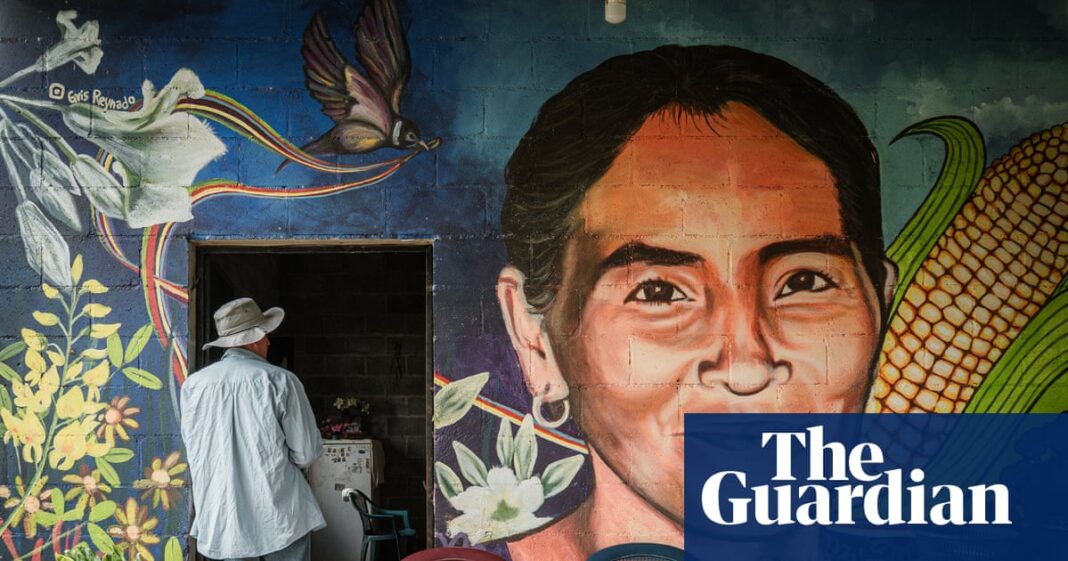Set off the main road through San Isidro, El Salvador, an old gate sits locked by a chain. Across its rusted metal wire mesh are emblazoned the words: “Private property, entry forbidden.” A bus stop outside is covered with faded black and yellow posters. Though peeling with age, their message can still be read: “No to mining – yes to life.”
This is the site of what was once the El Dorado gold mining project. After the suspension of operations in 2009 amid community backlash, OceanaGold formally closed the project in 2017 following El Salvador’s historic prohibition of metal mining.
But 10 months after hardline President Nayib Bukele’s administration repealed this prohibition, environmentalists fear that El Dorado may become one of the key sites in the re-emergence of mining interests in the country – a political movement they say is being obscured by state secrecy.
In January, El Salvador’s energy directorate announced that government mining studies will remain “trade secrets”, blocking public access to data relating to metal mining in the country. Although no new mining projects have been officially announced, activists worry they are proceeding behind closed doors.
“Access to information is very poor,” says Ever Hernández, coordinator of the water management programme at Ades, an NGO based near the old El Dorado project and a prominent force against metal mining for decades. “They’re not revealing the information, though there are private deals being made with some companies that want to mine.”
Amid government silence, activists point to signs they say indicate a move to reactivate metal mining. Earlier this year, Blane Wilson, president of the US-based mining company Titan Resources, expressed interest in El Salvador, though he denied any active talks with the government. Wilson co-founded Nueva Esperanza (formerly Tombstone), which reportedly shares an address with Agrícola San José, a firm that has bought land that includes parts of the original El Dorado mining concession.
Reports have stated that Nueva Esperanza provided Agrícola San José with loans used to acquire those properties. Wilson has denied any commercial connection between Titan, Nueva Esperanza and Agrícola San José – though environmentalists allege that the firms’ overlapping finances and shared address point to a corporate structure designed to cover mining developments.
Even before the ban was formally lifted, people in the area reported the presence of Peruvian “consultants” who financed the community, mirroring the social-investment tactics once used by mining companies to win local support.
Infrastructure improvements near the El Dorado site continue to stir fears of a reopening. “There’s an effort to improve certain sections of the road which, in our view, are where the trucks carrying materials for the mine will pass,” says Vidalina Morales, president of Ades.
“In El Dorado, they had already finalised the exploration process – it’s ready to mine,” she says. “This is why there is an interest in exploiting the mine.”
Activists have flagged further developments in other areas of the country. In January, members of the armed forces occupied a site connected to historic gold mining in San Sebastián. The following month, Citalá Resources was registered in El Salvador’s commercial registry. According to a report published by Dialogue Earth, its board members are linked to the controversial Cerro Blanco gold project.
The report also claims that two other firms were established in December 2024 as mining support companies, just days before the new mining law was approved.
Bukele’s administration remains silent on the topic.
“This is their communication strategy,” says activist Leonel Herrera, who believes the president is waiting until after the 2027 elections before advancing more openly with mining projects, which may damage his popularity in a country known for its strong anti-mining movement.
Meanwhile, campaigners say they are being monitored under Bukele’s administration. Morales says it is common to see strangers loitering outside their office, while colleagues have reported being followed. “We don’t know by whom, but our work is being very closely watched,” she says, sitting in front of the portraits of three activists murdered in 2009 after protesting against the El Dorado project.
In 2023, the government placed 7,000 soldiers, a tank and 1,000 police officers in the community of Santa Marta, alleging they were there to police gang activity. Morales believes it was an act of intimidation.
after newsletter promotion
Another, according to Morales, was “the Santa Marta Five”, a trial of five environmental leaders from her organisation in a high-profile case with international repercussions. On 24 September, they were acquitted of the alleged murder of a woman during El Salvador’s civil war. The charges, widely condemned by organisations as politically motivated, saw the five men fight a legal battle lasting almost two years that included one reversed acquittal and an eight-month stint in prison.
Though greeted by jubilation outside the courtroom, the result also caused trepidation. The appeal could go to the supreme court, and the five men may have to pay damages, even though they have no criminal convictions.
“The struggle is far from over,” said Pedro Cabezas, coordinator of the Central American Alliance on Mining, in a statement after the trial. “It may take years before the Santa Marta Five are declared fully innocent.”
Despite the acquittal of the Santa Marta Five, the atmosphere of repression has far from dissipated. Not least, legislation such as Bukele’s foreign agents law, which imposes a 30% tax on foreign donations to NGOs, has crippled the funding of numerous organisations dedicated to environmentalism and human rights defence.
As environmentalists fear that new mining projects quietly advance, El Salvador finds itself in the middle of a growing environmental crisis. Widespread deforestation, the climate crisis and rising demand for water have placed a critical strain on the country’s ability to meet the needs of its population.
According to a 2022 World Bank report, El Salvador’s annual water availability is 1,752 cubic metres for each inhabitant, compared with more than 10,000 cubic metres in other Central American nations.
“El Salvador is suffering from a dramatic water crisis in terms of quantity, quality and access,” says Andrés McKinley, who for more than 20 years has advocated against metal mining in the country, having previously worked at Oxfam.
McKinley says existing mines in other Central American countries need more than a million litres of water a day to operate and pose a contamination risk due to the widespread use of cyanide, a toxic element common in gold extraction.
In San Isidro, close to the site of the El Dorado project, El Salvador’s water crisis is felt keenly. “The well has been dropping every year,” says one man from San Isidro, who wished to remain anonymous. “Sometimes in the summer it doesn’t last.”
In his locality, well water is rationed to about one day a week, rotating daily among five nearby communities. Additionally, people fear that the water might be contaminated with arsenic. “We have arsenic in that well,” says the man. “In dry season, people still have to drink it, as some don’t have the money to buy water.”
While many workers make just $10 (£7.50) a day, a box of 25 small water bags (each holding about 500ml or 17oz) costs $12.
For many, the threat posed by the return of metal mining is as cultural as it is commercial. “To lose the river is to lose our history, our identity – it is to lose ourselves,” says Mirian Alas López, 45, a seamstress from Chalatenango.
Since 2005, she has been a member of the CCR, a community organisation instrumental in El Salvador’s national anti-mining movement. “If mining companies come here and exploit the land, this is what they will take from us,” López says.
José Felipe Tobar, 68, a founding member of the CCR was a member of the 500-strong group that drove the Canadian mining company Au Martinique out of the territory 20 years ago.
“Those who benefit from mining are the president, big private companies, and the multinationals,” he says. “It’s not true that common people will benefit from mining.”
In the central park of San José Las Flores, Chalatenango, Tobar leans on his walking stick. Children laugh and skip across the asphalt, watched from a distance by two armour-clad soldiers. Automatic weapons are slung loosely over their shoulders.
“We are going to die one day,” he says. “But the fight never dies.”


